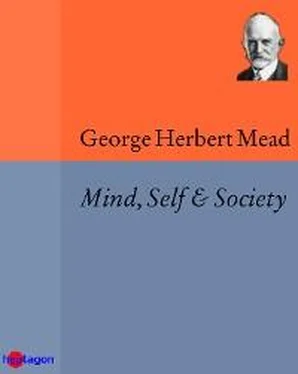George Herbert Mead - Mind, Self & Society
Здесь есть возможность читать онлайн «George Herbert Mead - Mind, Self & Society» — ознакомительный отрывок электронной книги совершенно бесплатно, а после прочтения отрывка купить полную версию. В некоторых случаях можно слушать аудио, скачать через торрент в формате fb2 и присутствует краткое содержание. Жанр: unrecognised, на английском языке. Описание произведения, (предисловие) а так же отзывы посетителей доступны на портале библиотеки ЛибКат.
- Название:Mind, Self & Society
- Автор:
- Жанр:
- Год:неизвестен
- ISBN:нет данных
- Рейтинг книги:3 / 5. Голосов: 1
-
Избранное:Добавить в избранное
- Отзывы:
-
Ваша оценка:
- 60
- 1
- 2
- 3
- 4
- 5
Mind, Self & Society: краткое содержание, описание и аннотация
Предлагаем к чтению аннотацию, описание, краткое содержание или предисловие (зависит от того, что написал сам автор книги «Mind, Self & Society»). Если вы не нашли необходимую информацию о книге — напишите в комментариях, мы постараемся отыскать её.
Mind, Self & Society — читать онлайн ознакомительный отрывок
Ниже представлен текст книги, разбитый по страницам. Система сохранения места последней прочитанной страницы, позволяет с удобством читать онлайн бесплатно книгу «Mind, Self & Society», без необходимости каждый раз заново искать на чём Вы остановились. Поставьте закладку, и сможете в любой момент перейти на страницу, на которой закончили чтение.
Интервал:
Закладка:
If one says that his experience of an object is made up of different sensations and then undertakes to state the conditions under which those sensations take place, he may say that he is stating those conditions in terms of his own experience. But they are conditions which are common to all. He measures, he determines just what is taking place, but this apparatus with which he measures is, after all, made up of his sensuous experience. Things that are hot or cold, rough or smooth, the objects themselves, are stated in terms of sensations; but they are stated in terms of sensations which we can make universal, and we take these common characters of experience and find in terms of them those experiences which are peculiar to the different individuals.
Psychology is interested in this correlation, in finding out what the relationship is between what goes on in the physical world and what goes on in the organism when a person has a sensory experience. That program was carried out by Hermann Helmholtz. The world was there in terms which could be stated in the laws of science, i.e., the stimuli were stated in physical terms. What goes on in the nervous system could be stated more and more exactly, and this could be correlated with certain definite experiences which the individual found in his own life. And the psychologist is interested in getting the correlation between the conditions under which the experience takes place and that which is peculiar to the individual. He wishes to make these statements as universal as possible, and is scientific in that respect. He wants to state the experience of an individual just as closely as he can in terms of the field which he can control, those conditions under which it appears. He naturally tries to state the conduct of the individual in terms of his reflexes, and he carries back as far as he can the more complex reflexes of the individual to the simpler forms of action. He uses, as far as he is able to use, a behavioristic statement, because that can be formulated in terms of this same field over which he has control.
The motive back of modern psychology gets an expression in the field of mental testing, where one is getting correlations between certain situations and certain responses. It is characteristic of this psychology that not only is it as behavioristic as it can be (in that it states the experience of the individual as completely as it can in objective terms), but it also is interested in getting such statements and correlations so that it can control conduct as far as possible. We find modern psychology interested in practical problems, especially those of education. We have to lead the intelligences of infants and children into certain definite uses of media, and certain definite types of responses. How can we take the individual with his peculiarities and bring him over into a more nearly uniform type of response? He has to have the same language as others, and the same units of measurement; and he has to take over a certain definite culture as a background for his own experience. He has to fit himself into certain social structures and make them a part of himself. How is that to be accomplished? We are dealing with separate individuals and yet these individuals have to become a part of a common whole. We want to get the correlation between this world which is common and that which is peculiar to the individual. So we have psychology attacking the questions of learning, and the problems of the school, and trying to analyze different intelligences so that we can state them in terms which are as far as possible common; we want something which can correlate with the task which the child has to carry out. There are certain definite processes involved in speech. What is there that is uniform by means of which we are able to identify what the individual can do and what particular training he may have to take? Psychology also goes over into the field of business questions, of salesmanship, personnel questions; it goes over into the field of that which is abnormal and tries to get hold of that which is peculiar in the abnormal individual and to bring it into relation with the normal, and with the structures which get their expression in these abnormalities. It is interesting to see that psychology starts off with this problem of getting correlations between the experience of individuals and conditions under which it takes place, and undertakes to state this experience in terms of behavior; and that it at once endeavors to make a practical use of this correlation it finds for the purposes of training and control. It is becoming essentially a practical science, and has pushed to one side the psychological and philosophical problems which have been tied up with earlier dogma under associational psychology. Such are the influences which work in the behavioristic psychology.
This psychology is not, and should not be regarded as, a theory which is to be put over against an associational doctrine. What it is trying to do is to find out what the conditions are under which the experience of the individual arises. That experience is of the sort that takes us back to conduct in order that we may follow it. It is that which gives a distinctive mark to a psychological investigation. History and all the social sciences deal with human beings, but they are not primarily psychological. Psychology may be of great importance in dealing with, say, economics, the problem of value, of desire, the problems of political science, the relation of the individual to the state, personal relations which have to be considered in terms of individuals. All of the social sciences can be found to have a psychological phase. History is nothing but biography, a whole series of biographies; and yet all of these social sciences deal with individuals in their common characters; and where the individual stands out as different he is looked at from the point of view of that which he accomplishes in the whole society, or in terms of the destructive effect which he may have. But we are not primarily occupied as social scientists in studying his experience as such. Psychology does undertake to work out the technique which will enable it to deal with these experiences which any individual may have at any moment in his life, and which are peculiar to that individual. And the method of dealing with such an experience is in getting the conditions under which that experience of the individual takes place. We should undertake to state the experience of the individual just as far as we can in terms of the conditions under which it arises. It is essentially a control problem to which the psychologist is turning. It has, of course, its aspect of research for knowledge. We want to increase our knowledge, but there is back of that an attempt to get control through the knowledge which we obtain; and it is very interesting to see that our modern psychology is going farther and farther into those fields within which control can be so realized. It is successful in so far as it can work out correlations which can be tested. We want to get hold of those factors in the nature of the individual which can be recognized in the nature of all members of society but which can be identified in the particular individual. Those are problems which are forcing themselves more and more to the front.
There is another phase of recent psychology which I should refer to, namely, configuration or gestalt psychology, which has been of interest in recent years. There we have the recognition of elements or phases of experience which are common to the experience of the individual and to those conditions under which this experience arises. There are certain general forms in the field of perception in the experience of the individual as well as in the objects themselves. They can be identified. One cannot take such a thing as a color and build it up out of certain sets of sensations. Experience, even that of the individual, must start with some whole. It must involve some whole in order that we may get the elements we are after. What is of peculiar importance to us is this recognition of an element which is common in the perception of the individual and that which is regarded as a condition under which that perception arises – a position in opposition to an analysis of experience which proceeds on the assumption that the whole we have in our perception is simply an organization of these separate elements. Gestalt psychology gives us another element which is common to the experience of the individual and the world which determines the conditions under which that experience arises. Where before one had to do with the stimuli and what could be traced out in the central nervous system, and then correlated with the experience of the individual, now we have a certain structure that has to be recognized both in the experience of the individual and the conditioning world.
Читать дальшеИнтервал:
Закладка:
Похожие книги на «Mind, Self & Society»
Представляем Вашему вниманию похожие книги на «Mind, Self & Society» списком для выбора. Мы отобрали схожую по названию и смыслу литературу в надежде предоставить читателям больше вариантов отыскать новые, интересные, ещё непрочитанные произведения.
Обсуждение, отзывы о книге «Mind, Self & Society» и просто собственные мнения читателей. Оставьте ваши комментарии, напишите, что Вы думаете о произведении, его смысле или главных героях. Укажите что конкретно понравилось, а что нет, и почему Вы так считаете.












